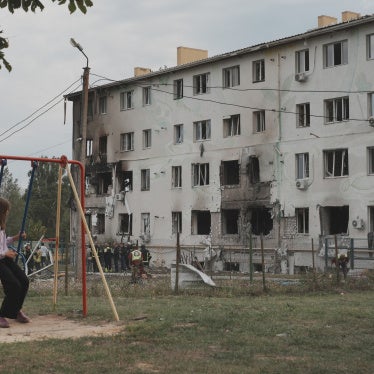In a report, Human Rights Watch documents Georgia's repeal of reforms that would have widened access to the courts to hear torture and other complaints of abuses by the police, procuracy, and security forces.
While "Dato," a twenty-one-year-old Tbilisi resident, languished in a city jail, after being tortured for two days by electric shocks and beatings, the authorities refused to let his lawyers see him. Legal reforms adopted last year in Georgia would have allowed Dato's lawyers to complain about the refusal and the torture directly to a judge. But just weeks after the reform went into force, the new complaints procedures were repealed. The best Dato could hope for was an appeal to the procuracy, the very institution that would prosecute his case in court.
"The reforms would have strengthened civilian oversight—through the courts—of the police and other security forces," said Rachel Denber, acting executive director of Human Rights
Watch's Europe and Central Asia division. "That's why this backtracking is so alarming. This also means that corrupt law enforcement has virtually unfettered power to coerce bribes from those whom they decide are under criminal investigation."
The Georgian parliament repealed these important reforms just weeks after Georgia was voted into the Council of Europe in April 1999. Since then, Georgia's abysmal record on torture has shown no improvement, and the report shows how the backtracking on legal reforms last year has contributed to continuing widespread, unchecked abuses.
The reforms affected the criminal procedure code, which governs criminal investigations and trials. Council of Europe experts had reviewed and the Georgian parliament had adopted the reformed criminal procedure code prior to Georgia's April 1999 admission to the organization. The Council is made up of the forty-one countries that have signed the European Convention on Human Rights. Countries that join the Council of Europe pledge to ensure that their national legislation and practice conform to convention standards. For some countries in Eastern Europe and the former Soviet Union, membership in the Council is seen as the first step toward integration into other European institutions such as the European Union and NATO.
A criminal procedure code that had included the reformed complaints procedures went into force in May 1999. But after a series of amendments to the code, adopted in May and July 1999, access to a court to submit a complaint about a procedural violation has been severely restricted. This means that those under criminal investigation, as well as others who may be involved in investigations, such as witnesses, in many cases have to wait until a trial begins in order to submit a complaint about a procedural violation to a court.
Lawyers, victims and their families interviewed by Human Rights Watch described how police, procuracy and other investigators in Georgia simply refuse access to lawyers during the early stages of an investigation. These officials also misclassify criminal suspects as "witnesses" to deprive them of rights that they should be entitled to, including to consult with a lawyer, or coerce detainees into hiring lawyers who will not complain or vigorously represent their interests. Defense lawyers noted that these tactics to restrict access to, or manipulate the choice of, a lawyer appear intended to suppress complaints of torture, to keep abusive officials from being prosecuted, and to prevent individuals who had signed false testimony or a confession from proving later that it had been obtained through torture.
Even later during the investigation, lawyers said that it is difficult, if not impossible, to obtain an impartial forensic medical examination to back up a complaint of torture. Police, procuracy and other investigators simply deny lawyers' requests for examinations. Although an individual may appeal to higher-level officials in the procuracy, the agency responsible for carrying out criminal prosecutions in Georgia, he or she has little or no opportunity to complain to a court while waiting for the trial to begin. This restriction on access to a court is alarming because in Georgia criminal investigations can take as long as nine months, yet evidence needed to back up a torture complaint can be lost in as little as two weeks, as bruises from beatings and burn marks from electric shocks applied in police stations begin to heal.







